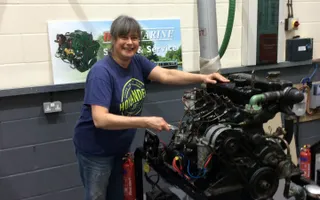Despite having lived aboard and boated for quite a few years I've never really got to grips with the engine on our narrowboat beyond topping up with water, anti-freeze, fuel and oil. I'm also terrified of electrics and potentially receiving an electric shock. But when you are a boater you do really have to be a bit more practical. To help me conquer my fears I booked a two-day basic boat engine and electrics course with a well-known marine rescue company.
I drove to Stafford very early in the morning for the first day of the course arriving only just in time for the start. Feeling embarrassed at being the last to arrive, I felt even worse when I realised that there was only one other woman on the course and she was attending the course with her husband, and that most of the people on the course were from one single boat club, and that the vast majority were cabin cruisers owners, from fairly modest boats to a monster with twin 470bhp engines!
By chance the only other narrowboat owner was sitting next to me and everyone was kind enough not to mention "sewer tubes" vs "yoghurt pots"!
Engineering mysteries revealed
I needn't have been so worried. The course tutors soon put everyone at ease and we commenced the first theory session on the importance of clean and free air flow, clean oil, clean fuel and the importance of a clean engine and bilges. Various engine parts were passed around the classroom; air, fuel and oil filters and even an array of tappets. I now know what tappets are, what they do, how to check and adjust their clearances and even what they sound like when they've gone wrong! The mysteries of engineering were steadily being revealed.
After a much needed break for coffee we had our first visit to the workshop once most of the class had put their overalls on. I'd got my mucky boat painting come grubby gardening trousers plus safety boots. Overalls are not necessarily required if you don't mind getting a little bit dirty, and to be honest, I hardly got dirty at all.
The workshop had three different diesel engines including a BMC 1.5 which isn't too dissimilar to my own boat's Mitsubushi Thornycroft engine. We were all put to work tracing through air, fuel and oil and systems and then we had a chance to get our hands dirty changing different types of filters and doing an oil change. I discovered that an oil change can be very tiring when you're pumping the oil out by hand and I learnt how to use a strap spanner.
Essential skills
After lunch we had another brief session in the classroom where I discovered the amazingly clever diesel injection system, how on earth did Herr Diesel ever work that out, let alone engineer the first injector? We then had another chance to play in the workshop learning how to bleed the fuel system. This is an essential skill for all boaters as you'll need to be able do this if you ever run out of fuel. Another really useful practical session included fault finding and repairing/adjusting Morse controllers and cables.
The only times I've ever called a boat service engineer out were for running out of fuel (yes, I am suitably embarrassed) and a snapped gear cable. I now feel confident I can deal with both myself. It might be a little bit fiddly and occasionally messy but neither are a terribly difficult or technical task and something all boaters should be able to do.
End of the first day
The first day finished with gearboxes, drive plates, couplings and repacking a stern gland. I particularly liked the stern gland model which allowed you to fiddle about pulling the packing out and putting in back in again. Ignoramus that I was, I had never realised that the packing is in fact rope, mainly because it's a job that I've never done. I also didn't realise that it is possible to replace the stern packing without dry docking the boat. If you are properly prepared you shouldn't sink!
Loads learnt and more to learn on day two. I really did begin to feel that it wasn't as complicated as I'd originally thought.




